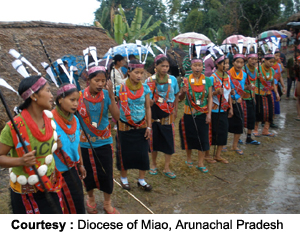|
The dances, performe d
by the tribes of Arunachal Pradesh, have been broadly divided into four
groups. The first group is the ritual dances which may again be divided
into five sub-groups. The first sub-groups includes those dances which
form part of the various rituals performed to secure prosperity, good
health and happiness of the dancer, his family, village or the whole community.
The second sub-group comprises of those dances performed in ceremonies
related to agriculture and domestication of animals to secure a good harvest
and increase of domestic animals respectively. d
by the tribes of Arunachal Pradesh, have been broadly divided into four
groups. The first group is the ritual dances which may again be divided
into five sub-groups. The first sub-groups includes those dances which
form part of the various rituals performed to secure prosperity, good
health and happiness of the dancer, his family, village or the whole community.
The second sub-group comprises of those dances performed in ceremonies
related to agriculture and domestication of animals to secure a good harvest
and increase of domestic animals respectively.
The third sub-group is associated with the funeral ceremony when the soul
is guided by a priest to its abode in the land of the dead and to prevent
it from haunting its old residence. It is generally believed that if the
soul returns to its old home the bereaved family suffers diseases and
deaths. The fourth sub-group consists of the fertility dances. These are
magical in the sense that the imitation of the movements of coition is
believed to promote fertility. War-dances make the fifth sub-group, which
are on the decline with the stoppage of internecine feuds and raids. In
the old days, when an expeditionary party was successful in killing an
enemy or more, the victors used to perform a ceremony on return, so that
the spirit of the slain could do no harm to the slayer. Only among the
Idu Mishmis, the victim's family also used to perform rites praying for
success in taking vengeance. Dance formed a part of this ceremony. The
war-dance used to be prevalent among almost all the non-Buddhist tribes.
The second group is the festive-dance which forms the
recreational part of a particular festival. The third group is the recreational
dances which do not form part of any particular festival or ritual. These
are performed on occasions which inspire its participants to express their
mirth through these dances. The fourth group is the pantomimes and dance-dramas
which narrate a mythical story or illustrate a moral.
|

